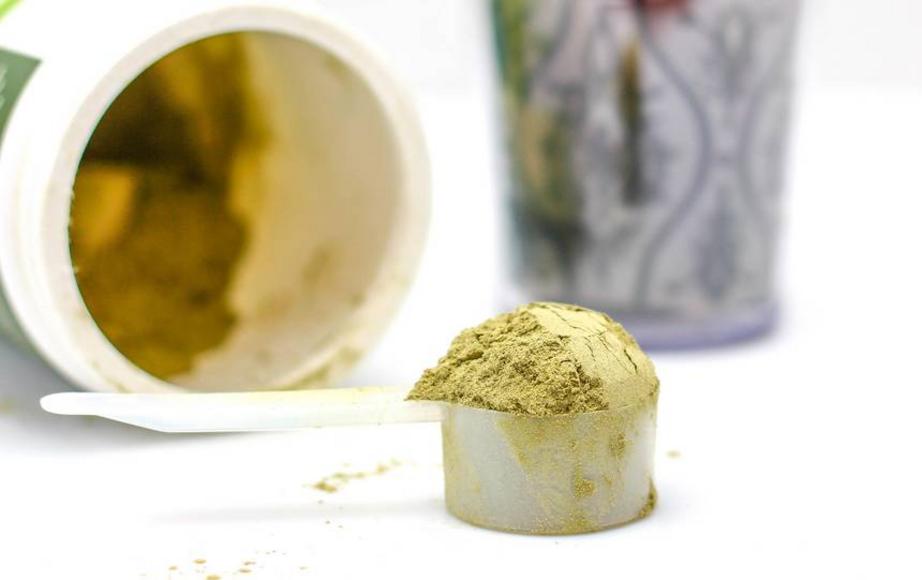Do you know what's really in your protein powder?
A new study has found that nearly all protein powders contain detectable levels of at least one heavy metal, and 55% tested positive for BPA.
Four times a week, when I get home from the gym, I reach for the blender, dump in some water and coconut milk, a spoonful of tahini or almond butter, a handful of frozen fruit, and add a generous scoop of protein powder. In seconds, I have a tasty, filling shake that's supposed to help repair and build my muscles. But now, after reading about a study conducted by the Clean Label Project, I'm left wondering if perhaps my protein shake habit isn't as beneficial as I thought.
The 2018 Protein Powder Study tested 134 of the most popular protein powder brands in the United States. These were chosen based on data from Nielson, Amazon, and bestseller lists from popular fitness websites. They included conventional whey- and egg-based proteins, vegan and plant-based proteins, as well as organic and non-organic types.
The brands were tested for heavy metals (including arsenic, cadmium, lead, and mercury), pesticides, BPA/BPS (plasticizers that are known endocrine disruptors), residual solvents, mycotoxins, melamine and its analogues, and antibiotics residues.
Test results showed that nearly all protein powders contained detectable levels of at least one heavy metal, and 55 percent tested positive for BPA. This is alarming, as BPA is a known hormone disruptor that has been linked to breast and prostate cancers, as well as low sperm counts and disfigurements.
Curiously, the plant-based proteins had higher contamination levels than whey-based ones. Sean Callan, a neuroscientist and director of operations at Ellipse Analytics, the lab that tested the protein products, says this could be due to plants being more prone to absorbing heavy metals from the soil in which they're grown.
"Whey and egg proteins may have lower levels of heavy metals because the source of the contamination would likely be the feed given to the animals. Callan suspects the animals' digestive systems diffuse some of the toxins."
Being organic didn't make much difference either. In fact, "organic protein supplements had higher levels of heavy metals, on average, than nonorganic," likely due to the predominance of plant-based material in the organic powders.
The findings are alarming, especially considering that many Americans and Canadians use multiple protein products on a daily basis. There is debate over how effective this is, considering that most people in wealthier industrialized nations have diets higher in protein than the body actually needs; some argue there is no point in supplementing further.
I like what Nancy Rodriguez, a professor of nutritional sciences at the University of Connecticut, told TIME last year:
"I work from a foods-first philosophy. There are bioactive ingredients in foods that we can’t duplicate [in a powder], but we know are helpful.” Eating a food that is naturally high in protein tends to also provide other nutrients a person might need, says Rodriguez. "When I see people only eating egg whites for protein, I tell them to also eat the yolk for vitamins A and B."
In other words, never underestimate the power of whole foods! We know whole foods are the best in every other category of vitamin and mineral, so why not do the same when it comes to protein?
The Clean Label Project has been criticized in the past for failing to provide adequate data for its studies and submitting for peer review; this time it's possible to see the data and the score cards for each brand, as well as an informal description of how the study was conducted. More details would be helpful.
Nevertheless, as Consumer Reports points out, it's not the first time protein powders have been found to contain worrisome contaminants and it's good to keep in mind that the supplements industry is only loosely regulated:
"Though they fall under the purview of the Food and Drug Administration, the agency classifies them differently from drugs. The companies that make and sell them aren’t required to prove that they’re safe, that they work as advertised, or even that their packages contain what the labels say they do."
These findings put someone like me in an awkward spot. I always buy plant-based protein powders, usually Iron Vegan, because I don't want whey or egg sources; vegan seems healthier. Despite learning that the whey and egg proteins are cleaner, I still don't want to make the switch; instead, I think I'll focus less on the post-workout protein shake and try to eat more protein-rich whole foods in the hours following my workouts.
For the rest of this article please go to source link below.

